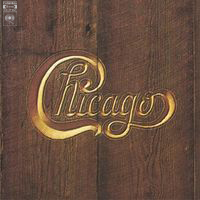History
Following the release of Chicago III in 1971, the group changed from producing double albums, with many songs arranged in extended suites, in favor of more concise tracks on a single album. [3] It is often considered the group's return-to-basics as it has a sound resembling their first album, Chicago Transit Authority.Chicago V is also notable for Robert Lamm's prolific songwriting; Eight out of its ten tunes are composed solely by him. Terry Kath wrote and sang the album's final track "Alma Mater", which showcased his acoustic guitar abilities. The song "A Hit by Varèse" is a tribute to French-American composer Edgard Varèse. This would be the last album not to have any compositions from Peter Cetera during his tenure in the band.
Recorded just before Chicago at Carnegie Hall was released in late 1971, Chicago V was cut in just over a week and held over for release until the following summer. Released shortly before the album, the single "Saturday in the Park" was the band's biggest hit to that point, reaching No. 3 in the US. [4] Chicago V was critically acclaimed and became Chicago's first No.1 album, [5] spending nine weeks atop the charts in the US. [6] In the UK, the release managed to reach No. 24. [7] The follow-up single "Dialogue (Part I & II)" also became a hit, peaking at No. 24 in the US. [4]
This album was mixed and released in both stereo and quadraphonic. In 2002, Chicago V was remastered and reissued by Rhino Records with three bonus tracks: a rehearsal of Lamm's "A Song for Richard and His Friends", which was debuted at Carnegie Hall, an early rehearsal of Kath's "Mississippi Delta City Blues" (which would later be re-recorded and released on Chicago XI ), and a single edit of "Dialogue".
On August 17, 2011, Warner Japan released this album as a hybrid stereo-multichannel Super Audio CD in their Warner Premium Sound series. [8]
This page is based on this
Wikipedia article Text is available under the
CC BY-SA 4.0 license; additional terms may apply.
Images, videos and audio are available under their respective licenses.
